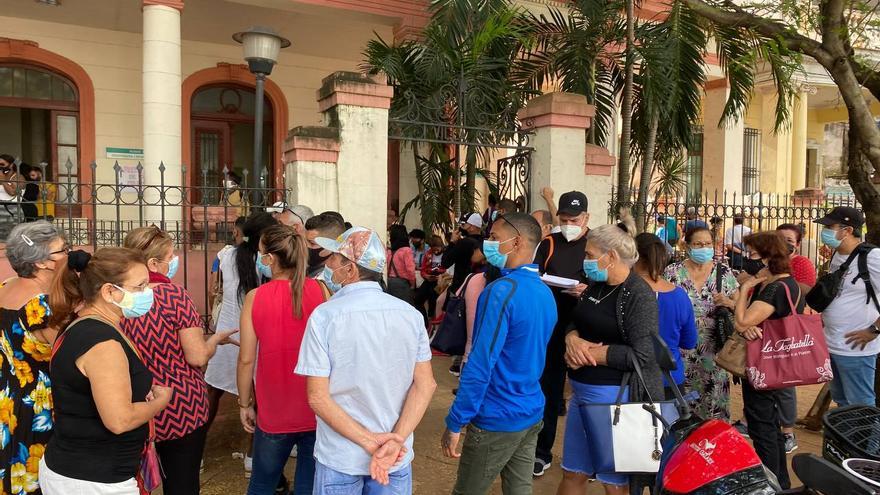
![]() 14ymedio, Havana, 12 January 2022 — The progressive increase in coronavirus cases in Cuba will be the norm from now on, and will increase, at least during the first quarter of the year. “[There will be a] rapid growth in the number of confirmed cases, with high peaks, which could strain the health system, but also an abrupt decline in mid-March,” according to Raúl Guinovart Díaz, dean of the Faculty of Mathematics and Computing at the University of Havana and a government statistical expert for the pandemic, who updated the forecast of the evolution of the disease in a meeting led by Prime Minister Manuel Marrero.
14ymedio, Havana, 12 January 2022 — The progressive increase in coronavirus cases in Cuba will be the norm from now on, and will increase, at least during the first quarter of the year. “[There will be a] rapid growth in the number of confirmed cases, with high peaks, which could strain the health system, but also an abrupt decline in mid-March,” according to Raúl Guinovart Díaz, dean of the Faculty of Mathematics and Computing at the University of Havana and a government statistical expert for the pandemic, who updated the forecast of the evolution of the disease in a meeting led by Prime Minister Manuel Marrero.
The mathematician explained to the committee of experts that it will be necessary to prepare for the possibility of high pressure on the health system, and take steps to guarantee the care of the most vulnerable. In addition, he asked to deepen the work of primary care, home quarantine and the communication campaign to the population.
Guinovart maintained that the booster dose of the vaccines will have to be accelerated and that Cuba starts with the advantage of having immunized 92% of the population, according to official data, although he stressed that the omicron variant is very contagious and cases will increase in all territories.
The high rate of vaccination in other countries has not prevented the explosion of infections that affects the world, where daily records are the norm, and the Island plans to continue along the same path, since the sequencing of most of the samples that are currently collected belongs to the omicron strain, according to María Guadalupe Guzmán Tirado, head of the Research, Diagnosis and Reference Center of the Pedro Kouri Institute of Tropical Medicine. However, the delta variant continues to circulate through Cuba at the same time.
The Minister of Health, José Angel Portal Miranda, indicated that it has been detected that omicron has progressively moved since its arrival in Cuba – the last week of November – from the western zone through which it entered to the eastern zone.
Currently, Pinar del Río, Camagüey, Matanzas, Havana, Cienfuegos and Las Tunas are the provinces where the highest transmission has been found, accounting for 62.3% of the cases diagnosed in the last month.
Despite the leaps and bounds in the contagion data in recent days, the Government tried to maintain optimism by insisting that the growth is not as great as in other countries. The authorities are confident that the high number of vaccinated people will serve to contain the disease, although it is enough for them to look at countries with similar percentages of immunization, such as Spain or Portugal, where not only have the cases been progressively doubling, but the intensive care systems are already under pressure.
The variant seemed to have milder symptoms – thanks in part to vaccinations – according to studies that came out of South Africa, where the existence of omicron was first reported. However, that country had some biases: although vaccination is not as widespread, the population is younger and is more resistant to the coronavirus than older people are. Now, in Europe, despite the fact that a large part of the population is immunized, we see that the enormous transmissibility increases the number of people who can end up getting seriously ill, especially the most vulnerable.
This Tuesday, at the experts’ meeting, the new care protocol was also discussed, which, according to the prime minister’s advance last week, will limit hospital admissions. Ileana Morales Suárez, National Director of Science and Technological Innovation of the Ministry of Public Health, explained that children under two years of age, children who have not completed the vaccination schedule or with risk factors, will be evaluated for hospitalization. The same will be true for pregnant and postpartum women, the unvaccinated and patients with co-morbidities.
In addition, the preventive use of Nasalferon will be used in risk groups, which include pregnant women admitted to the Maternity Home and contacts of positive cases, older adults in Nursing Homes, patients over 60 years of age in Psychopedagogical Medical Centers, and people older than 50 years in Social Protection Centers.
On Tuesday, Cuba reported 2,685 new cases of covid-19 in the previous 24 hours, in addition to one deceased from the disease. There are currently 11,136 active cases, of which 28 are classified as serious and three as critical.
The trend has forced the cancellation of the XXIII Edition of the face-to-face Havana Festival, scheduled for February 2022, which was announced yesterday and now for the second consecutive year. The same is true for the the Jazz Plaza de Cuba Festival.
The Prime Minister, Manuel Marrero Cruz, asked that the measures and protocols be applied with discipline, because “in the face of ómicron there can be no confidence.”
____________
COLLABORATE WITH OUR WORK: The 14ymedio team is committed to practicing serious journalism that reflects Cuba’s reality in all its depth. Thank you for joining us on this long journey. We invite you to continue supporting us by becoming a member of 14ymedio now. Together we can continue transforming journalism in Cuba.
